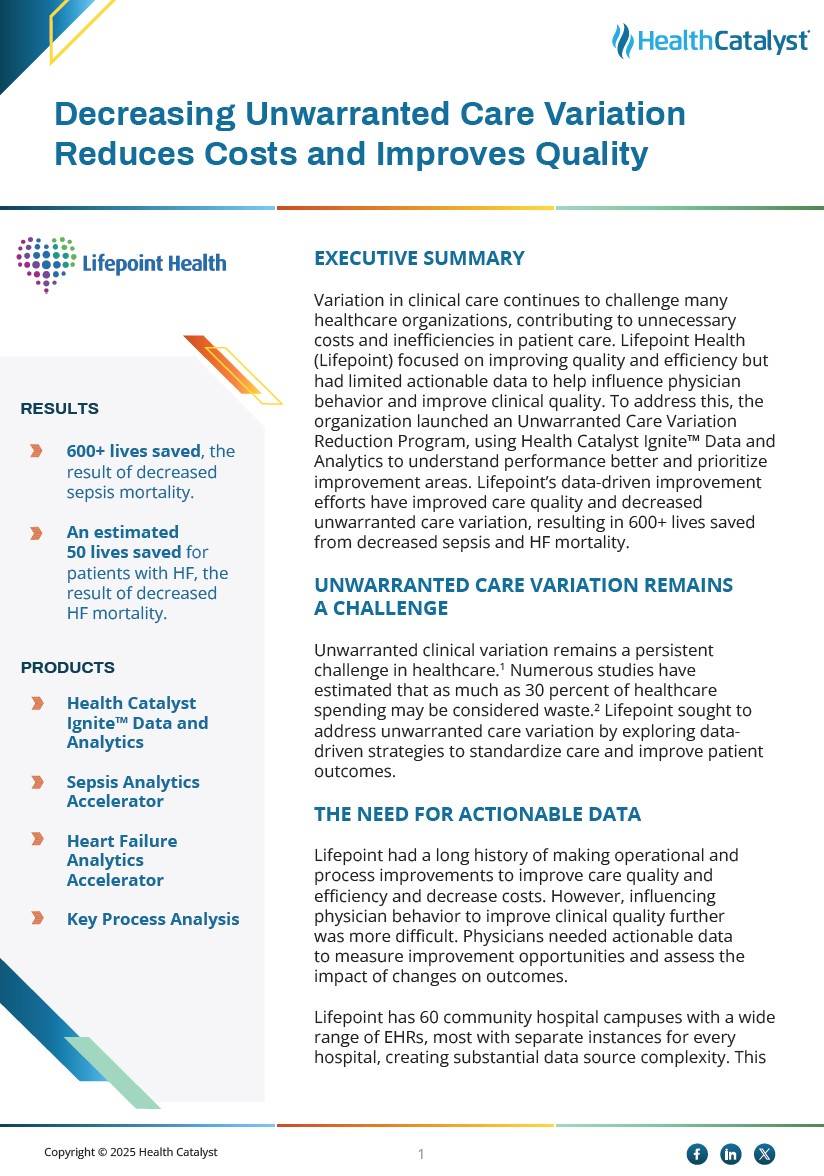Variation in clinical care continues to challenge many healthcare organizations, contributing to unnecessary costs and inefficiencies in patient care. Lifepoint Health (Lifepoint) focused on improving quality and efficiency but had limited actionable data to help influence physician behavior and improve clinical quality. To address this, the organization launched an Unwarranted Care Variation Reduction Program, using Health Catalyst Ignite™ Data and Analytics to understand performance better and prioritize improvement areas. Lifepoint’s data-driven improvement efforts have improved care quality and decreased unwarranted care variation, resulting in 600+ lives saved from decreased sepsis and HF mortality.
Unwarranted clinical variation remains a persistent challenge in healthcare.1 Numerous studies have estimated that as much as 30 percent of healthcare spending may be considered waste.2 Lifepoint sought to address unwarranted care variation by exploring data-driven strategies to standardize care and improve patient outcomes.
Lifepoint had a long history of making operational and process improvements to improve care quality and efficiency and decrease costs. However, influencing physician behavior to improve clinical quality further was more difficult. Physicians needed actionable data to measure improvement opportunities and assess the impact of changes on outcomes.
Lifepoint has 60 community hospital campuses with a wide range of EHRs, most with separate instances for every hospital, creating substantial data source complexity. This complexity made it challenging to equip physicians with the data needed to compare hospitals, drive change, track progress, and evaluate the impact on outcomes.
To overcome these challenges, Lifepoint established an Unwarranted Care Variation Reduction Program across its system. A key component of this team’s work is using Health Catalyst Ignite™ Data and Analytics, which combines best-in-class technologies, healthcare-specific data models, self-service tools, and industry expertise to achieve data-informed healthcare improvement at scale.
Using Ignite, Lifepoint combined data from the organization’s varied EHRs and billing data, providing a unified view of data to support automated, near-real-time insights into performance. Lifepoint gained insight into performance, enabling it to assess and prioritize care-variation improvement opportunities. With insights from the Health Catalyst Key Process Analysis and other data analyses, the organization prioritized sepsis care, heart failure (HF) care, optimizing blood product utilization, and reducing repetitive laboratory tests.
Lifepoint combined high-quality data and analytics with strong clinical and executive leadership, direct provider engagement, and clinical improvement teams to build a successful model of care variation reduction. Strong physician leadership of the improvement program significantly accelerated process improvements by increasing physician participation and willingness to change across the system.
Lifepoint partnered with Health Catalyst’s Clinical Improvement Services to implement standard, evidence-based practices and used process improvement methods, change management strategies, and clinical analytics to improve performance. The organization focused on improving three-hour sepsis bundle compliance, implementing restrictive blood transfusion practices, ensuring guideline-directed medical therapy (GDMT) guideline adoption for HF, and decreasing the number of repeat laboratory tests.
Lifepoint leveraged Ignite to access both process and outcome metric performance and the detailed data required to help facilitate physician behavior change. For example, with AI-driven analytics, Lifepoint provided physicians with clear evidence of which interventions had the most significant impact using their own data, enabling data-driven decision-making and accelerating the adoption of best practices. Lifepoint used the Sepsis Analytics Accelerator to monitor the sepsis three-hour bundle compliance, holding regular workgroup meetings to drill into the data to identify root causes contributing to lower-than-desired performance. The organization could visualize and monitor process and outcome metrics for each improvement priority, enabling systemwide improvements.
Lifepoint’s data-driven improvement efforts have improved care quality, decreased unwarranted care variation, and enabled the organization to achieve its financial improvement targets. Results include:
"Access to real-time, high-quality clinical data has been a game-changer in our efforts to reduce care variation and improve patient outcomes. By leveraging advanced analytics and AI-driven insights, we empower our physicians and care teams with the tools they need to drive meaningful change."
- Raj Agarwal, MD, MPH, MBA, Vice President, Clinical Transformation, Lifepoint Health
Building on this success, Lifepoint is expanding its use of Ignite™ Data and Analytics across its enterprise. The organization is committed to further harnessing data and analytics to improve patient outcomes, reduce readmissions, and ensure clinical documentation reflects true patient acuity.


